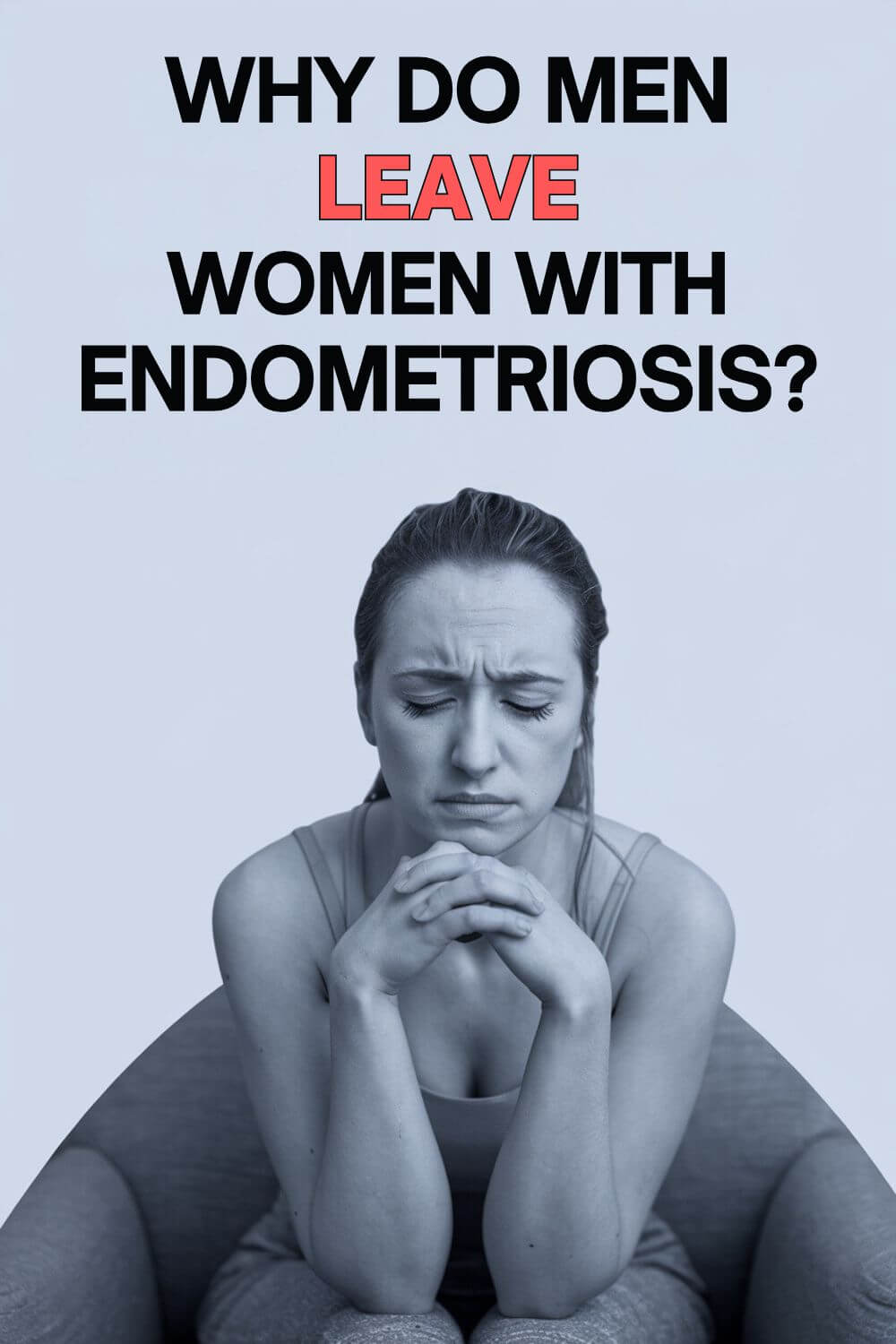Why Do Men Leave Women with Endometriosis?
When I first learned about my wife’s endometriosis, I was overwhelmed by the complexities of the condition and the profound impact it had on our lives. I couldn’t help but wonder why some men choose to leave their partners during such challenging times. Men leave women with endometriosis, but is it fair, you may ask?
Men may leave women with endometriosis due to the emotional strain, physical limitations, and intimacy challenges that the condition imposes on relationships, leading to feelings of helplessness and frustration.
Reflecting on my own journey, I realized that the lack of resources and support for male partners contributed to these feelings. I often felt isolated, unsure of how to help my wife or cope with my own emotions. This experience highlighted the need for better guidance and understanding for men in similar situations.
In this article, I will share insights and strategies that have helped me support my wife and strengthen our relationship amidst the challenges of endometriosis.
Endo-Tool: Endometriosis for Men
I know firsthand how challenging it can be to support a partner with endometriosis while feeling isolated and unsure of where to turn. That’s why I’ve created a resource that I believe will make a real difference: a FREE chapter of my book, available when you subscribe.
This isn’t just a typical freebie; it’s a gateway to more personal, in-depth support through my emails, where I share practical tips, heartfelt stories, and insights drawn from my own journey.
By subscribing, you’ll receive exclusive offers, printables, and a substantial discount on the entire book, ensuring you have the tools and knowledge you need to truly support your loved one. The first chapter alone contains all the comprehensive medical knowledge about endometriosis, including:
- What is endometriosis?
- What are the symptoms?
- What causes endometriosis?
- What does endometriosis look like?
- What are the stages?
- What are the types?
- What is adenomyosis and how is it related to endometriosis?
- Why do some women develop severe endo and others don’t?
- Does endometriosis cause infertility?
- How is endometriosis diagnosed?
- Do types and stages affect the treatment?
- Recurrence of endometriosis after excision surgery.
FREE Chapter of “Endo-Tool”
Endometriosis e-Book for Men
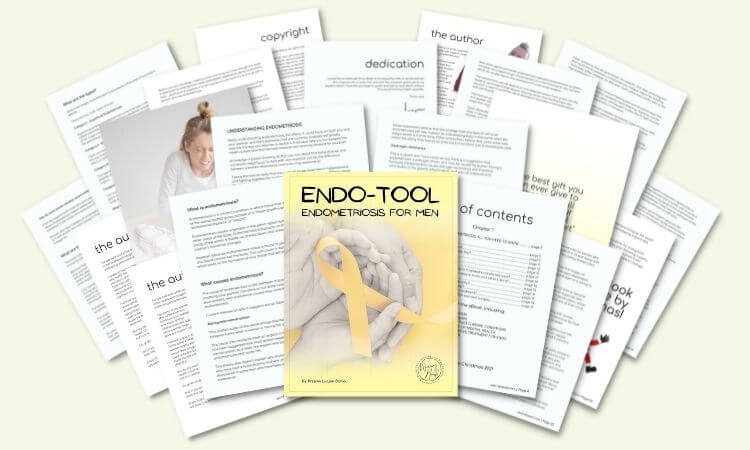
Reason 1 – the Emotional Toll
I’ve spent countless nights lying awake, grappling with the reality of my wife’s pain and the overwhelming weight it brings to our relationship. It’s no secret that endometriosis doesn’t just affect the person diagnosed—it seeps into every corner of a partnership, leaving both people feeling drained, hopeless, and sometimes broken.
Why do men leave women with endometriosis? The answer often lies in the emotional toll, which is far heavier than most can understand unless they’ve lived it.
Feelings of Helplessness and Guilt
There were times when I felt utterly powerless, unable to ease her pain or provide the comfort she so desperately needed. Watching someone you love suffer while feeling useless is one of the hardest things I’ve ever faced. This guilt can be crushing for any partner.
Struggles with Emotional Intimacy
Endometriosis takes a toll on emotional connection. Pain, fatigue, and mental health struggles can create walls in a relationship. As a man, I often felt pushed away—not intentionally—but it was difficult not to internalize the distance and feel rejected.
Isolation from Others
Society rarely acknowledges the role of male caregivers. I often felt isolated, unable to share my challenges or find others who truly understood. This lack of support and validation can make any man feel lost and alone in the struggle.
Impact on Mental Health
Being a caregiver is emotionally draining. Anxiety, depression, and burnout become all too common, and the stigma around men discussing these struggles can worsen the burden.
The Weight of Expectations
Society often expects men to be the rock, the strong one. But even the strongest can feel broken when the person they love is hurting every single day. The weight of these expectations, combined with personal struggles, can drive many to their breaking point.

Reason 2 – Physical and Intimacy Challenges
I won’t sugarcoat it—one of the hardest parts of supporting a partner with endometriosis is coping with the way it impacts physical intimacy. Men leave women with endometriosis more often than we care to admit, and intimacy is a major factor. When chronic pain and discomfort enter the bedroom, they bring a host of challenges that can strain even the strongest of relationships.
Let’s get personal for a minute…
I still remember the day when my wife moved away from me because it hurt her. Well, being a hung man has it perks, but on a serious note, this has never been an issue to her – it was great! Until the day when it wasn’t…
We were in a hotel during Easter and I remember that evening as if it was today. It was a decade ago!
No matter how gentle I tried to be, no position seemed to work for her. This made me feel as if I was hurting her, but I was not rough at all, I was beyond gentle. She felt guilty for pushing me away. Both of us did not know what the heck was going on!? It took 5 years to find out, but during that time until the diagnosis it was a rollercoaster of emotions for both of us.
Allow me to get into more detail…
Pain During Intimacy
Endometriosis often makes sexual intimacy painful or even impossible at times. As a husband, watching my wife suffer through something that is supposed to bring joy and connection was heartbreaking. It was hard not to feel frustrated or rejected, even though I knew it wasn’t her fault. This challenge requires endless patience, understanding, and honest conversations.
Fear of Causing Pain
There were many moments when I hesitated to initiate intimacy out of fear that it would hurt her. This fear can lead to emotional distance and a loss of confidence, leaving both partners feeling disconnected and uncertain.
Redefining Intimacy
We had to learn to redefine what intimacy meant in our relationship. It wasn’t just about physical connection anymore—it became about emotional closeness, small gestures of love, and finding new ways to be close despite the barriers. It wasn’t easy, but it was necessary for us to stay strong together.
Communication Barriers
Endometriosis can make it difficult to discuss intimacy without hurt feelings or misunderstandings. As a man, I had to learn to listen without judgment and express my own feelings openly—something that didn’t come naturally but was essential for keeping our bond intact.
Societal Pressure on Sexual Expectations
Society places a lot of pressure on men to be strong, passionate, and always ready. When endometriosis alters the dynamics of a relationship, these expectations can feel crushing. I had to remind myself that our relationship wasn’t defined by what others thought it should be—it was defined by how we supported and loved each other through the hardest times.
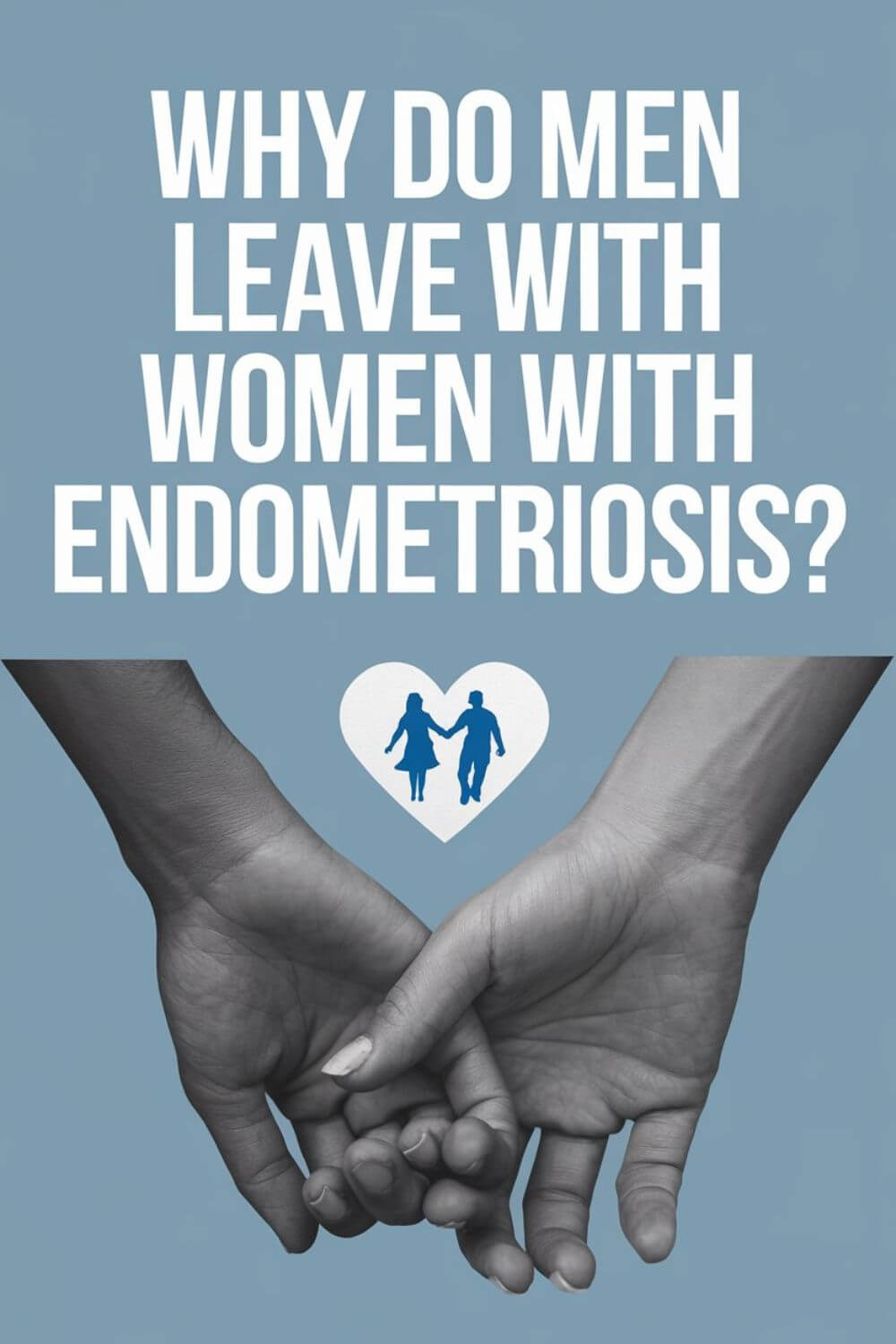
Reason 3 – the Mental Health Strain
I’ve come to realize that one of the most challenging aspects of supporting a partner with endometriosis is the toll it takes on mental health—not just for my wife but for myself as well. Men leave women with endometriosis in part because the relentless mental strain can feel impossible to manage.
Anxiety, depression, and a sense of hopelessness often creep in, creating a storm that can overwhelm even the most committed partners.
For my wife it was on another level. Not only endometriosis and fibromyalgia caused her to struggle at work and earn money, she became extremely anxious, had nightmares, panic attacks at night and in the evenings, but also developed OCD (Obsessive-Compulsive Disorder) which till this day she battles.
Self-harm, suicidal thoughts became the new normal. My wife even tried to take her own life on two occasions.
Did I mention that she asked me to divorce her “for the sake of my happiness” as she put it? She believed that I wouldn’t be happy with her and assumed that my life would be much better with a healthy woman. Well, I didn’t think so…
Coping with Anxiety and Depression
Watching my wife suffer day in and day out left me feeling anxious and depressed. I worried constantly—about her pain, about our future, about whether I was doing enough to help. These emotions can build up over time, leading to feelings of burnout and despair.
The Burden of Responsibility
The weight of being a caregiver can be crushing. I felt like I had to be strong for her all the time, even when I was crumbling inside. This unspoken expectation to always hold it together made it difficult to ask for help or even admit that I was struggling.
Loss of Self-Identity
In the midst of caring for my wife, I sometimes lost sight of who I was outside of the role of caregiver. This loss of identity can lead to feelings of isolation and frustration. It’s crucial for male partners to find ways to reclaim their sense of self and engage in activities that bring them joy.
Lack of Support and Resources
There were many times when I felt completely alone in my struggle. While there are resources and communities for women with endometriosis, support for male partners is often lacking. This isolation can lead to a sense of helplessness and even resentment if left unaddressed.
Navigating the Stigma of Male Vulnerability
Society doesn’t always make it easy for men to express vulnerability. Admitting that I was struggling felt like a weakness, but I’ve learned that true strength lies in asking for help. Breaking down these stigmas and seeking support is essential for male caregivers facing mental health challenges.
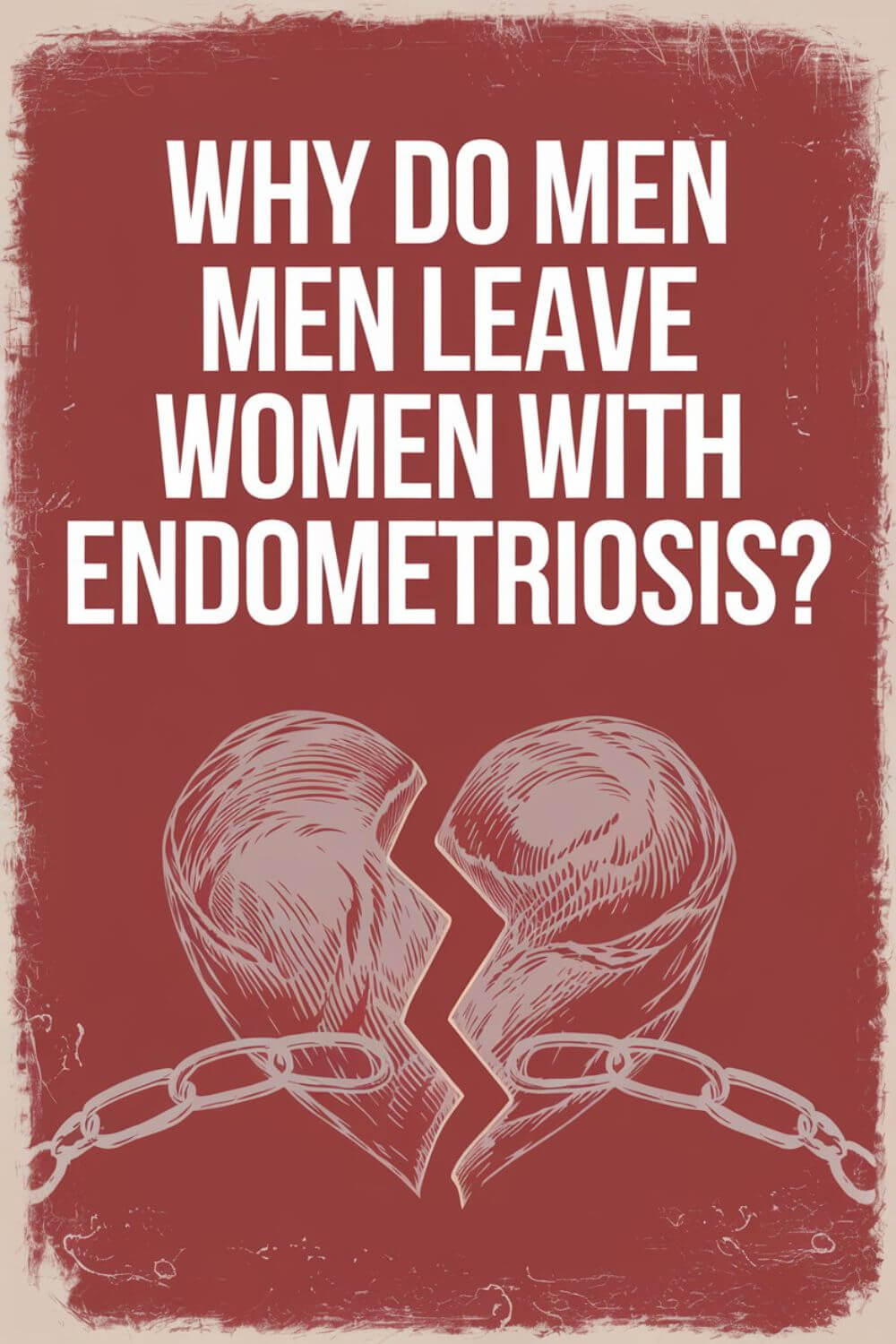
The Role of Communication in Keeping Relationships Strong
I’ve learned that open communication is the lifeline of any relationship, especially when endometriosis is part of the equation. I always thought that a real man doesn’t leave her woman. I still do, but this is a bit more complicated….
Every bloke has a right to have kids and family, I get that, but what about her?
She doesn’t have such privilidge either, and on top of that, she’s in pain, mental distress, financial strain, and the lack of people’s understanding of what she’s going through. She deals with a lot! Why on earth would I leave her and make her feel more alone than she already feels?
Men leave women with endometriosis when communication breaks down and misunderstandings, frustration, and emotional distance take over. Navigating a life filled with chronic illness, let alone two, requires conversations that are honest, vulnerable, and often difficult—but they are what hold us together when everything else seems to be falling apart.
Talking About Pain and Limitations
Discussing the reality of my wife’s pain wasn’t easy. It’s heartbreaking to hear her describe the constant, unrelenting discomfort she feels. But avoiding these conversations only made things worse. Open dialogue allowed me to understand her experience better and be a more supportive partner.
Expressing Your Own Needs and Feelings
There were moments when I felt overlooked, as though my struggles didn’t matter in comparison to hers. I had to find the courage to speak up about my own needs and feelings without guilt. Healthy communication goes both ways—it’s about creating a space where both partners feel heard and validated.
Managing Conflict with Empathy
Living with endometriosis brings stress, which can lead to conflict. I had to learn how to approach disagreements with empathy and patience, rather than letting frustration boil over. This was challenging, but it made a huge difference in how we resolved issues and supported each other.
Finding Solutions Together
Communication isn’t just about venting frustrations; it’s also about finding solutions. Whether it was figuring out ways to manage her symptoms or making adjustments to our daily routines, working together as a team strengthened our bond and reminded us that we were in this together.
Being Patient and Compassionate
Not every conversation goes smoothly. There were times when we both felt misunderstood, overwhelmed, or defensive. Patience and compassion became our guiding principles, reminding us to come back to each other with kindness and a willingness to listen, even when it was hard.
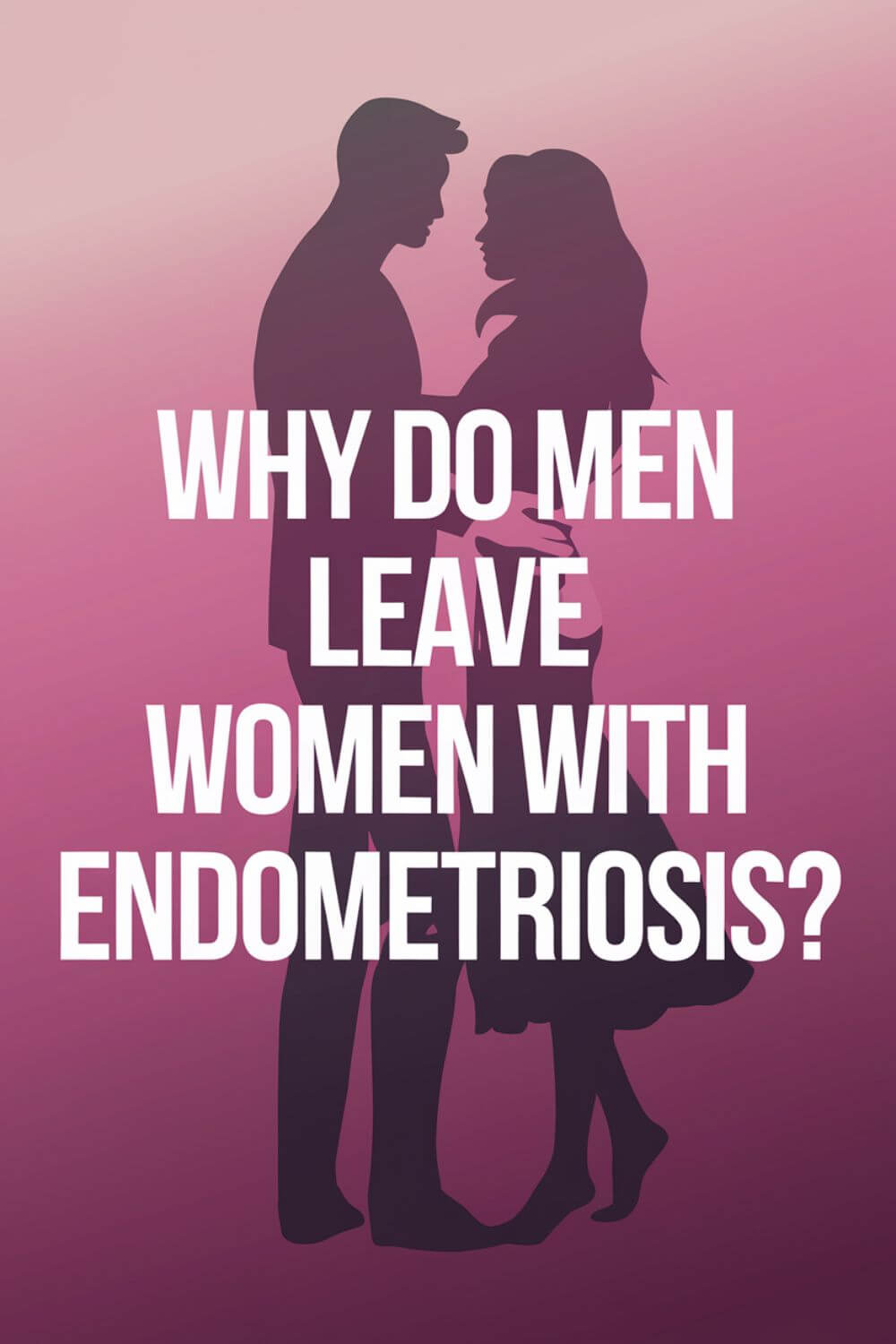
The Weight of Expectations and Societal Pressure
I’ve often felt the crushing weight of societal expectations as a man supporting a partner with endometriosis. My wife never expected things of me, but I have values – I’m a man.
Men leave women with endometriosis for many reasons, but one that stands out is the relentless pressure of being the “strong one,” the provider, and the fixer—all while dealing with a situation that can’t simply be fixed. Society’s traditional views on our masculinity often leave us feeling trapped, isolated, and overwhelmed in their caregiving roles.
Let’s explore this more…
The Expectation to Always Be Strong
From the beginning, I felt like I had to be unbreakable for my wife, no matter how much I was struggling inside. Society often paints men as protectors who shouldn’t show weakness, but trying to maintain that facade can be exhausting. I had to learn that it’s okay to be vulnerable, to admit when I’m overwhelmed or need support.
Pressure to “Fix” Everything
There’s an inherent drive in many men to solve problems. When faced with my wife’s pain and chronic health issues, I wanted desperately to find a solution. But endometriosis isn’t something that can be easily “fixed,” and coming to terms with that was incredibly difficult. The pressure to find answers can lead to feelings of failure and frustration.
Stigma Around Male Caregivers
Being a male caregiver comes with its own set of challenges and stigmas. There were times when I felt dismissed or misunderstood, even in healthcare settings. The lack of recognition and validation for male partners can make the journey feel even more isolating.
Financial and Career Pressures
Supporting a partner with endometriosis often means juggling medical expenses, lost income, or job changes. The stress of these financial burdens can add to an already overwhelming situation, pushing some men to their breaking point. Balancing work, caregiving, and personal well-being is a constant struggle.
Social Expectations and Judgments
People don’t always understand the sacrifices and challenges of living with a partner who has a chronic illness. I’ve faced judgment, insensitive comments, and unrealistic expectations from others, all of which can make an already difficult situation even harder to bear. Letting go of societal judgment and focusing on what truly matters in our relationship has been a hard but necessary step.
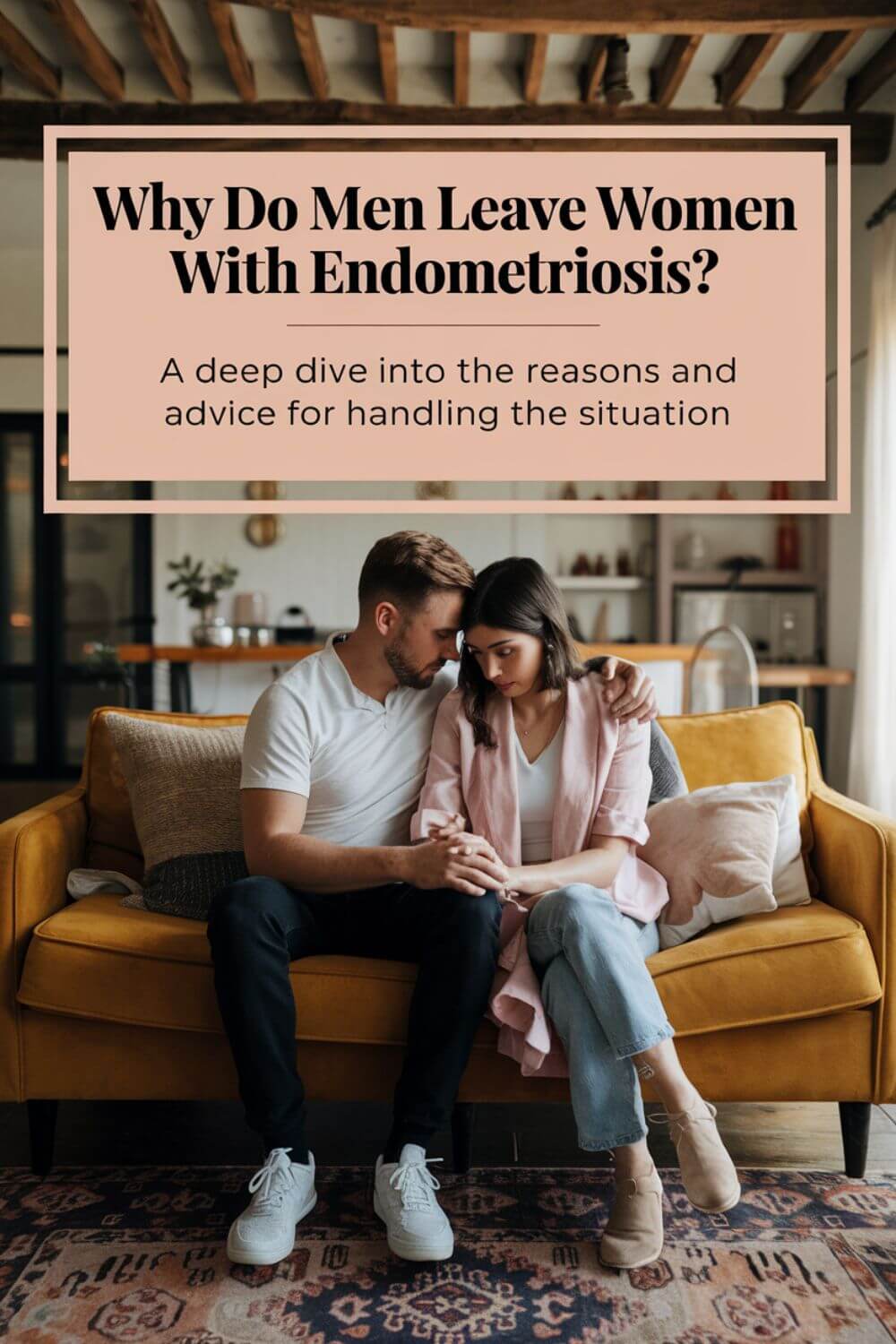
Why Staying Matters More Than Leaving?
I’ve thought deeply about what keeps some men by their partner’s side when faced with the immense challenges of illness such as endometriosis—and why others choose to leave. Many men leave women with endometriosis due to a mix of physical, emotional, and societal pressures. But for those of us who stay, it’s about finding strength in love, resilience, and a commitment to weathering the storm together. It’s about rewriting what it means to be a partner when life doesn’t go as planned.
I am never going to leave my wife. Sexual affairs went through my mind knowing I couldn’t have penetrating sex with my wife. But sex is more than that. Our situation actually only sparked in me more kinks than I would ever think of before she got ill. Yes – I openly admit, I like to experiment, and you know what – our sex life improved. It faded for a while but reignited with fire!
All you need is love and imagination…
The Power of Love and Commitment
Love isn’t just a feeling; it’s a choice we make every day, especially during difficult times. My commitment to my wife isn’t contingent on her health—it’s rooted in who she is and the life we’ve built together. Choosing to stay means embracing the hard days and finding ways to bring light into our relationship despite them.
Building Resilience Together
Endometriosis has taught me what true resilience looks like. It’s not about ignoring the pain or pretending everything is okay; it’s about standing side by side, even when the world feels heavy. By facing the challenges together, we’ve grown stronger, learning how to adapt and support each other in ways we never thought possible.
Creating a Supportive Network
Staying doesn’t mean going it alone. I’ve realized the importance of seeking out support from friends, family, and others who understand what we’re going through. Building a network of people who care makes the journey more bearable and helps us feel less isolated.
Finding Joy Amidst Challenges
Life with endometriosis isn’t easy, but that doesn’t mean it can’t be meaningful. We’ve learned to celebrate small victories, create moments of joy, and cherish the times when my wife feels even a little better. These moments remind us why we keep fighting for each other.
Embracing a New Normal
Endometriosis changed the life we envisioned, but it didn’t take away our ability to find happiness. By redefining what normal looks like for us and focusing on what truly matters—love, connection, and mutual respect—we’ve created a life worth fighting for. Staying isn’t always easy, but it’s always been worth it.

Staying Together Despite Endometriosis
When you’re faced with the reality of endometriosis, it’s easy to feel lost, defeated, and unsure of the future.
But I’ve learned that love, resilience, and unwavering support can be more powerful than any challenge this condition throws our way. What is missing in the endometriosis community is the recognition of the men who choose to stay—those who fight for their relationships, who find strength in their love, and who commit to walking this difficult road together.
To every partner who feels overwhelmed – you are not alone. Your support, compassion, and dedication make a difference, even when it doesn’t feel like it. I encourage you to find your strength, lean on others when you need to, and never forget the impact you make just by being present in her life.
Together, we can change the narrative and bring hope to every relationship touched by endometriosis.
Thank you for joining me on this journey!
Please share your thoughts in the comments below and don’t forget to grab your “Endo-Tool: Endometriosis for Men” freebie to gain deeper insights and support. Remember, you are stronger than you know, and together, we can make a difference.


About Me
Hi, I’m Lucjan! The reason why I decided to create this blog was my beautiful wife, who experienced a lot of pain in life, but also the lack of information about endometriosis and fibromyalgia for men…
